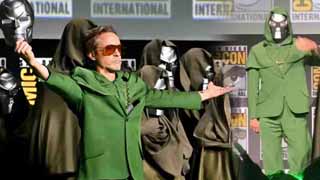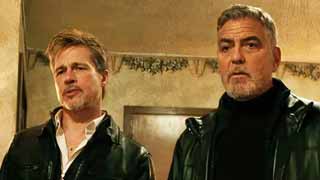In 1989, Steven Soderbergh changed the independent film business forever with sex, lies and videotape. A decade later, he conquered Hollywood. But it's important not to yadda yadda away the years in between, when his sophomore slump (1991's Kafka) extended to a junior slump (1993's King of the Hill) and a senior slump (1995's The Underneath), and he seemed lost in a wilderness of his own design.
Arguments can be made for his work during this period - the Depression-era drama King of the Hill is one of his best films, and all three are varied and conceptually adventurous - but Soderbergh himself felt so discombobulated by failure that he wrote, directed, starred, edited and photographed.
When Soderbergh started 2000 with Erin Brockovich and ended it with Traffic, both earning him best director nominations at the Oscars (he won for the latter), it almost felt calculated, like he had made a bet with himself that he could pivot from indie iconoclast to commercial juggernaut over the course of a four-year period.
As many of the era's biggest stars - George Clooney, Brad Pitt and Matt Damon chief among them - strolled out to the Fountains of the Bellagio in Las Vegas at the end of his Ocean's Eleven remake in 2001, it was the capper to a time when Soderbergh had cracked the code, squaring his sensibility with mass-market entertainment.








 Tenet Review: An ingenious piece of Nolan's cinematic vision!
Tenet Review: An ingenious piece of Nolan's cinematic vision! 'The Great Heist' Review: A nail-biting Columbian thriller based on a historic robbery
'The Great Heist' Review: A nail-biting Columbian thriller based on a historic robbery Bollywood Stars Who Were Absent from the Big Screen in 2024
Bollywood Stars Who Were Absent from the Big Screen in 2024 Top 10 Bollywood Movies of 2024 - Unforgettable Hits
Top 10 Bollywood Movies of 2024 - Unforgettable Hits Cinematic Gems of India - Highly Acclaimed Regional Movies
Cinematic Gems of India - Highly Acclaimed Regional Movies ‘Upload’ Trailer: ‘The Office’ Creator Greg Daniels Heads to Amazon with a Sci-Fi Comedy About the Digital Afterlife
‘Upload’ Trailer: ‘The Office’ Creator Greg Daniels Heads to Amazon with a Sci-Fi Comedy About the Digital Afterlife Sea Fever UK Trailer Featuring Connie Nielsen, Dougray Scott and Hermione Corfield
Sea Fever UK Trailer Featuring Connie Nielsen, Dougray Scott and Hermione Corfield Universal Is the First Studio to Make New Movies Available On-Demand During Cororonavirus Outbreak
Universal Is the First Studio to Make New Movies Available On-Demand During Cororonavirus Outbreak